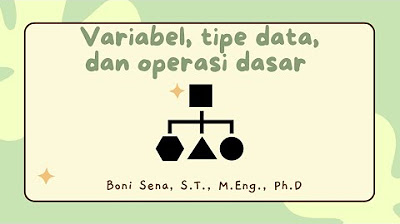Belajar Python [Dasar] - 04 - Mengenal Variabel
Summary
TLDRIn this engaging tutorial on Python programming, the instructor introduces the concept of variables, explaining their role in storing data and drawing parallels to mathematical variables. Key topics include creating variables, naming conventions, and the absence of explicit data type declarations in Python. The tutorial features practical demonstrations in the Python terminal, showcasing variable assignments and updates. The session concludes with a preview of the next topic on data types, enticing viewers to continue learning. This tutorial serves as a foundational step for beginners eager to grasp Python programming essentials.
Takeaways
- 😀 A variable in Python is a named location in memory used to store data, similar to mathematical variables.
- 😀 Variables can be assigned values directly, such as `a = 10`, and these values can be changed later.
- 😀 Python's interactive shell allows users to perform calculations and test code snippets in real-time.
- 😀 Variable naming conventions in Python require that names cannot contain spaces and should start with a letter or underscore.
- 😀 Using underscores in variable names is encouraged to improve readability, e.g., `my_variable`.
- 😀 It is important to avoid starting variable names with numbers or using special characters other than underscores.
- 😀 The value of a variable can be updated at any time, demonstrating flexibility in coding.
- 😀 Indirect assignment is possible in Python, allowing one variable to take the value of another, e.g., `b = a`.
- 😀 The tutorial emphasizes the importance of understanding how to declare and manage variables effectively.
- 😀 The next topic in the series will cover different data types that can be assigned to variables in Python.
Q & A
What is the primary topic of the tutorial?
-The primary topic of the tutorial is understanding variables in Python.
How do you assign a value to a variable in Python?
-You can assign a value to a variable by using the equals sign, for example, `a = 10`.
What is the significance of variables in programming?
-Variables are used to store data, allowing you to reference and manipulate that data throughout your program.
Can variables in Python hold different data types?
-Yes, variables in Python can hold various data types, including integers, floats, strings, and more without requiring explicit type declarations.
What are the rules for naming variables in Python?
-Variable names cannot contain spaces, must not start with a number, and can include letters, numbers, and underscores.
What happens if you change the value of a variable?
-If you change the value of a variable, the new value will replace the old one, and any references to that variable will reflect the updated value.
What is indirect assignment in the context of variables?
-Indirect assignment occurs when a variable is assigned the value of another variable, such as `b = a`. Changes to `a` after this assignment will affect `b`.
Why is it mentioned that Python does not require data type declarations?
-Python is dynamically typed, meaning you don't need to declare a variable's data type explicitly; Python infers the type based on the assigned value.
What is the interactive shell used for in Python?
-The interactive shell allows users to test Python commands and see results immediately, making it a useful tool for learning and debugging.
What will happen if you try to use a space in a variable name?
-Using a space in a variable name will result in a syntax error, as spaces are not allowed in Python variable names.
Outlines

This section is available to paid users only. Please upgrade to access this part.
Upgrade NowMindmap

This section is available to paid users only. Please upgrade to access this part.
Upgrade NowKeywords

This section is available to paid users only. Please upgrade to access this part.
Upgrade NowHighlights

This section is available to paid users only. Please upgrade to access this part.
Upgrade NowTranscripts

This section is available to paid users only. Please upgrade to access this part.
Upgrade NowBrowse More Related Video
5.0 / 5 (0 votes)





